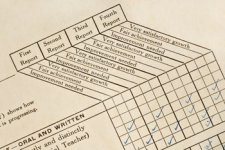GRADUATE Course – Understanding Special Learning Populations
“Today the chances are good that you know someone with autism or autism – like characteristics.”
“Have you ever come across a child who’s always on the move? They might have ADHD.”
“Gifted learners have competencies and abilities that go two or more years beyond their grade and/or age level.”
1 Graduate Credit
Grading: A-F
Materials: Included in […]
Understanding Special Learning Populations (1 Iowa LRC – Self Study)
“Today the chances are good that you know someone with autism or autism – like characteristics.”
“Have you ever come across a child who’s always on the move? They might have ADHD.”
“Gifted learners have competencies and abilities that go two or more years beyond their grade and/or age level.”
As teachers, […]
How does assessment work in differentiated instruction?

While implementing differentiated instruction, learners design their own rubrics and set their own achievement levels. They may be allowed to determine their own readiness level after demonstrating a level of prior knowledge. Teachers provide guidance and facilitation by incorporating collaboration and conference time as a part of each culminating activity. Teachers may also […]
Professional Development 1 Credit: Understanding Special Learning Populations

“Today the chances are good that you know someone with autism or autism – like characteristics.”
“Have you ever come across a child who’s always on the move? They might have ADHD.”
“Gifted learners have competencies and abilities that go two or more years beyond their grade and/or age level.”
Spring enrollments […]
SELF-STUDY: Understanding Special Learning Populations (15 hours)
“Gifted learners have competencies and abilities that go two or more years beyond their grade and/or age level.”
As teachers, we all face situations where we accommodate students with special needs in our classrooms. In such situations, how can we modulate our teaching to ensure that we reach each and […]
SELF-STUDY: Differentiated Instruction (10 Hours)
“I enjoyed taking this course and learned a lot of new information
that I can implement in my classroom. Thanks!”
Welcome to this dual course aimed to help you understand more about differentiated instruction. This dual course consists of the following 5 hour courses:
Accommodating All Learners
Gifted Learners in the Classroom
In the […]
How can I Support Twice-exceptional Students in the Classroom?

Twice-exceptional students include gifted learners who exhibit the following indicators:
Discrepancy between verbal and performance ability.
Extremely frustrated by school.
Auditory and/or visual processing problems which may cause slow response, work delay or an appearance of thinking slowly.
Short-term or long-term memory issues.
Motor difficulties exhibited by clumsiness, poor handwriting or problems completing paper-and-pencil type tasks.
Lack of organizational […]
SELF-STUDY: Differentiation for Gifted Learners in the Classroom (5 clock hours)
Gifted learners have competencies and abilities that go two or more years beyond their grade and/or age level.
This course examines some of the challenges facing gifted learners and offers easily implemented accommodations and success strategies. By understanding the unique learning needs of children who are considered “gifted,” participants will […]
How can Morning Minute Challenges be used for Teaching Gifted Learners?

Gifted learners are generally curious at the start of the day. “Will there be anything new and exciting for me?” The Morning Minute Challenges is a useful tool when teaching gifted learners.
Keep a folder of clippings and resource tips in a visible and consistent location in the classroom, so that students will know […]
What are the Signs of Impulsivity in ADHD?

Understanding the main challenges in Attention Deficit Hyperactivity Disorder (ADHD) helps teachers reach and teach students with ADHD more effectively.
At the same time, it is imperative that teachers do not attempt to diagnose any student. Only a trained person can do that.
ADHD is a disorder with many degrees ranging from moderate to severe. […]



